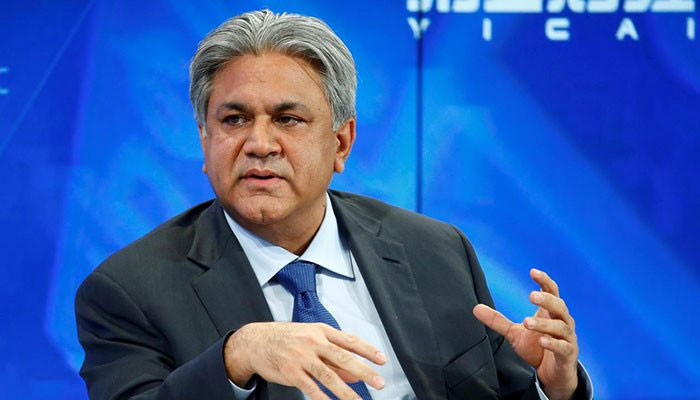Abraaj Group’s Arif Naqvi denied bail by UK court
Naqvi is charged with inflating the value of Dubai-based firm’s holdings but he strongly denies all allegations
April 27, 2019

LONDON: Arif Naqvi, a renowned entrepreneur, philanthropist and the founder of Abraaj Group, was denied bail by an English Judge after Crown Prosecution Service (CPS) said he may flee to Pakistan rather than face US fraud charges and that Naqvi wrote down the number of Pakistan’s president at the time of his arrest three weeks ago at London's Heathrow Airport.
Sitting at the Westminster Magistrates Court on Friday afternoon, Judge Emma Arbuthnot denied bail to Naqvi after prosecutor Rachel Kapila said the 58-year-old scribbled out the phone number of Arif Alvi and seven others when he was arrested.
"I’m concerned to see he had the president’s number on him," Arbuthnot said. "If he were to be granted bail, I’d be extremely concerned he would leave the country.
“There is a strong concern he will flee to Pakistan if granted bail,” Kapila said.
The US doesn’t have an extradition treaty with Pakistan, she said. If he did flee to the country, it would be "extremely difficult to get him back”.
The emerging markets businessman appeared in person for the latest stage in his extradition battle to US where he faces charges of defrauding investors.
Naqvi, along with other executives of Abraaj Group, is charged with inflating the value of the Dubai-based firm’s holdings but he has strongly denied all allegations. He has been known to have been cooperating extensively with the Joint Provisional Liquidators of the Abraaj Group, PwC and Deloitte and proposed a restricting plan for aid creditor recovery.
The decision by the judge to refuse bail to Naqvi came after his lawyer Hugo Keith QC made strong representations for his bail and dealt with each and every allegation levelled by the prosecution, who was arguing on behalf of the Department of Justice in the United States; each allegation was refuted strongly with solid arguments and facts.
The prosecution moved away from their previous argument where they said $500 million was taken by Mr Naqvi, and conceded they could not provide a specific number as the investigations had not been completed. The prosecution did, however, give an indication that it was to the tune of millions of dollars as opposed to hundreds of millions, as previously stated to the court. The prosecution also conceded that there was a need to provide more “robust factual allegations”.
The decision was surprising also because the same court and judge had already granted bail to former managing partner and head of impact investing of Abraaj, Sev Vettivetpillai, a week ago. The judge granted bail on condition that he offers up to £1million security package, paving a positive path for the same to be granted for Mr Naqvi.
Naqvi’s lawyers told the judge they wanted to put up a bail bond of £2million, to which the judge said she would require “many, many, many” multiples more. Mr. Keith QC said they would look to go higher if needed.
Keith told the court that Naqvi has known about allegations against him — and the high likelihood of the US indictment — for several months, yet he continued to live in London and returned to UK after each of his trips, willingly and knowingly.
The prosecutor told the court that Naqvi recently booked his ticket on British Airways but didn’t travel on that to Pakistan, and so presumably would have fled the UK by private jet. Naqvi’s lawyer then produced the boarding card of PIA that proved Naqvi instead travelled on PIA; he was remanded on his return to London, which continues to show his willingness to return. He also told the court that Naqvi could not be a “flight risk” because he didn’t have access to private jets as the Abraaj Group sold their private jet in 2016.
"My client has kept coming back to London and he has known about the allegations against him," his lawyer stated.
The lawyer told the court that the idea that Naqvi took money out for his personal benefit is ludicrous. He took the judge to documents and showed that any monies which Naqvi had taken out were legally entitled to him through his contractual arrangements with the company, and specifically also pointed out that no monies were moved from funds to Mr Naqvi’s direct personal benefit – and moreover, that the US allegations were in fact wrong, incorrect and misleading.
He clarified that while there have been lots of allegations in the media about the Gates Foundation having lost money after investing in their healthcare fund, the fact is that towards the end of 2017 and early 2018, all funds of the foundation along with all other investors in the fund were returned in full, and with interest – meaning that the Gates Foundation did not suffer any economic loss at all. Hugo Keith pointed out that the Securities Exchange Commission (SEC) in the US accepted monies had been returned, whereas the Department of Justice (DOJ) indictment had omitted to include this key point.
Hugo Keith QC also told the judge about a lot of philanthropic work Naqvi has done in the UK alone, saying he has donated significant sums to UK charities, and is a strong member of the UK community with very strong connections to Britain, where his family live.
The lawyer made a reference to a report by Deloitte in 2018 in which the accountancy firm confirmed that no criminality or misappropriation of funds took place at any stage.
During the hearing, the mention of Karachi Electric also came up as the lawyer told the judge that it was important for Arif Naqvi to be out on the bail so that he could continue negotiating for the successful deal finalisation of the K-Electric, which is in the national interest of the country. Letters from stakeholders of K-Electric were presented before the judge in which it was stated that Naqvi was crucial to the successful deal of the power distribution company and his involvement was important. The prosecutor, at the instruction of the DOJ, sought to downplay the relevance of the transaction.
He stressed that it was in the interests of the Abraaj investors if Naqvi was on bail and able to negotiate the monetization of assets in the group so that creditors and investors could get maximum benefits.
Hugo Keith QC laid out that allegations made by the US authorities were baseless and had no legal foundation. He also demonstrated how there have been a number of inaccuracies in press reportage and the prosecution’s case since his detainment, pointing directly to the inconsistencies between the US indictment and the SEC filing.
The prosecution on behalf of the US continued to oppose bail, citing they hoped to find more evidence which would take time – therefore meaning that they want to hold Mr Naqvi until that point.











